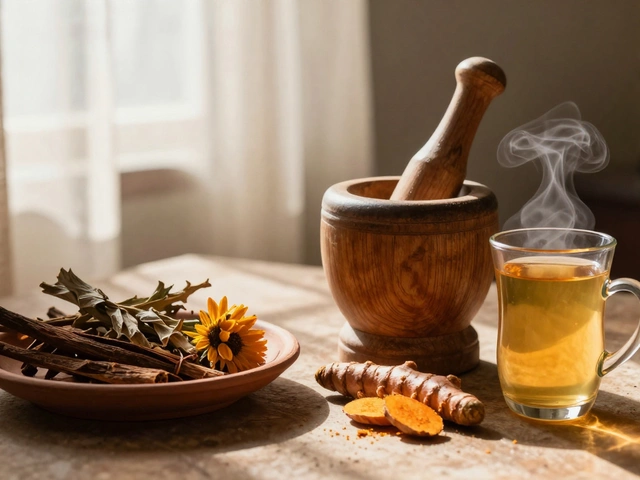So, you're thinking about taking herbal supplements? Well, it's not as straightforward as it seems. Sure, they sound all-natural and safe, but that's not the whole story. Believe it or not, herbal supplements can sometimes cause unwanted side effects or interact with medications you're already taking.
Let's start with what might surprise you: 'natural' doesn't always mean harmless. These supplements can pack a punch just like some medications, and while they offer benefits, you also need to be smart about how you use them. Have a chat with your doctor before diving into herbal remedies because, let's face it, they need to know what you're putting into your body, especially if you're on medication.
- Understanding Herbal Supplement Risks
- Potential Side Effects
- Interaction with Medications
- Tips for Safe Use
Understanding Herbal Supplement Risks
When it comes to herbal supplements, there's a bit of a wild west vibe. They're not as tightly regulated as prescription medications, which means you might not always know exactly what's in the bottle. This can lead to a bunch of potential issues. Let's break down what you should watch out for.
First off, purity can be a gamble. Since the regulation is pretty lax, some supplements might contain contaminants or even harmful substances, perhaps from poor manufacturing processes. Imagine thinking you're buying something super healthy and getting a bit of a chemical cocktail instead.
Quality can be another mixed bag. The active ingredients in herbal supplements can vary widely, even in products from the same batch, affecting how effective the supplement will be. This inconsistency can be a bit unsettling if you're looking for specific health benefits.
Another thing to consider is the lack of detailed research available for many supplements. While plenty of people swear by them, the scientific evidence isn't always so clear. That means ever-fascinated folks like you and me are sort of in the experimental zone, testing the waters to see what works and what doesn't.
To make matters a bit trickier, possible side effects aren't always listed. Some herbs, like kava and comfrey, have been linked to more severe health issues like liver damage. So doing a deep dive into each supplement's potential downsides isn't just smart—it's essential!
For a bit of perspective on this whole unregulated landscape, here's a quick snapshot:
| Issue | Potential Impact |
|---|---|
| Purity Concerns | Unwanted contaminants or chemicals |
| Quality Variability | Unpredictable potency and efficacy |
| Limited Research | Lack of reliable information on effectiveness |
| Undisclosed Side Effects | Unexpected health risks like liver damage |
Navigating this terrain requires vigilance. Always opt for brands with transparent practices and consider certifications from organizations like the USP or NSF if you spot them on the label. These can reassure you that the contents are what they claim to be.
Potential Side Effects
Alright, so let's dive into the potential side effects of herbal supplements. Just because they're from Mother Nature doesn't mean they're risk-free. Some of these side effects might catch you off guard.
Take, for instance, St. John's Wort, often used to tackle mild depression. While it's helpful for some, it can cause everything from dry mouth and dizziness to more severe side effects like increased sensitivity to sunlight. Another potential troublemaker is Ginkgo Biloba, famous for its supposed memory-boosting effects. But it can also lead to headaches, stomach upset, and even bleeding problems if you're not careful, especially if you're on blood thinners.
And let's not forget about Echinacea. People love it for supposedly boosting the immune system, but it can still cause allergic reactions. If you suffer from plant allergies, you might want to reconsider before adding it to your routine.
Here's a quick look at some common side effects associated with popular herbal supplements:
- Ginseng: May cause insomnia, headaches, and digestive issues.
- Kava: Linked to liver damage in some cases; caution is key.
- Valerian Root: Can make you drowsy or dizzy, so be careful if you're driving.
These side effects don't affect everyone, but it's wise to keep them on your radar. Always consider your body's reaction and consult with a healthcare professional if things seem off.

Interaction with Medications
Mixing herbal supplements with medications can be like mixing oil and water—sometimes they just don't play well together. These interactions can lead to some unexpected effects and not always the good kind. For example, if you're taking blood thinners like Warfarin, tossing in St. John's Wort might not be a great idea as it can mess up how the blood thinners work.
Let's look at a few more common culprits. Ginkgo biloba is another one to watch out for. While it might be popular for boosting memory, it can also increase bleeding risk, especially if you’re taking aspirin or anticoagulants. Then there's garlic supplements—lovely for heart health but can thin the blood when taken with anti-clotting meds.
Here’s a quick tip: Always check with your doc first. They can help you figure out if your supplement adventure might clash with your current meds. It's not a game of chance you want to play without expert advice. Don't assume it's fine just because it's natural. It's your health we're talking about!
To help you keep track, here's how some popular supplements may interact with common medications:
| Herbal Supplement | Potential Interaction | Common Medication |
|---|---|---|
| St. John's Wort | Can reduce effectiveness | Antidepressants |
| Ginkgo Biloba | Increases bleeding risk | Aspirin |
| Garlic | Enhances blood thinning | Warfarin |
See how it's not just about the herbs themselves? Knowing these potential interactions can help you be smarter about your choices and avoid any unpleasant surprises.
Tips for Safe Use
When it comes to using herbal supplements, a bit of caution can go a long way. Here are some practical tips to help you stay on track and avoid any hiccups.
- Research the Brand: Not all brands are created equal. Look for products that have been tested by third-party organizations, which can give you some confidence in their quality.
- Stick to Recommended Dosages: More isn't always better. Follow the dosages listed on the label and resist the urge to double up, thinking it might work faster.
- Watch for Side Effects: If you notice anything weird, like stomach upset or headaches, it might be time to hit pause. Your body might not be vibing with the supplement.
- Inform Your Doctor: Your doctor needs to know what supplements you're taking, especially if you're on medications. It's all about keeping things transparent for your safety.
- Consider Allergies: Pay attention if you have allergies. Some herbal supplements might contain ingredients that could trigger a reaction.
Need more information? Know that being informed is key. According to recent surveys, nearly 70% of folks taking supplements never tell their healthcare system about them, leading to possible risks. Don't be part of that statistic—play it safe for your own good.








